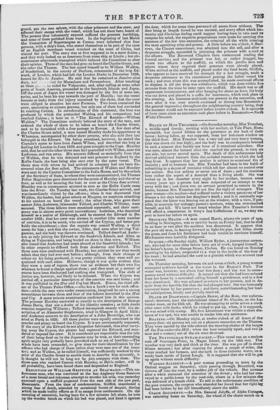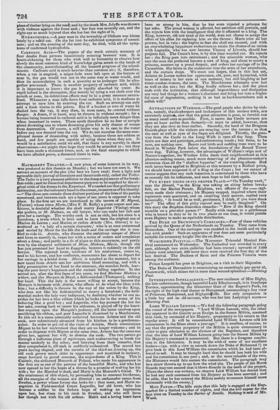DEATH or MISS'TREACHEN.—On Saturday morning, Miss Treacher, a middle-aged female,
residing with her mother, at Vale Place, Ham. mersmith, was found lifeless on the pavement at the back of their
house ; having fallen, as was supposed, from her bed-room window on the third floor. Miss Treacher was a very tall and very heavy woman, (she was above six feet high), and the body was in consequence bruised in such a manner that hardly one bone of it remained unbroken. She was seen, almost the instant after she reached the ground, to turn on one side, but never moved again. The death of this unfortunate lady derived additional interest from the secluded manner in which she had
long lived. It appears that her mother is subject to occasional fits of insanity ; and to humour her, Miss Treacher had been in the habit of
submitting to a degree of restraint which left her almost no control over
her actions. She was seldom or never out of doors ; and the mansion bore rather the aspect of a deserted than a living abode. She was
locked up in her chamber every night by her mother, because some
twenty years ago a person had been suspected of an attempt to run away with her ; and there was no servant permitted to remain in the house, because Mrs. Treacher did not like the sight of strangers. The poor woman—the mother—had suffered under a violent paroxysm of her disease a few days before her daughter's death ; and it is rationally sup. posed that the latter was leaning out at the window, with a view, if pos- sible, to ascertain her unhappy parent's motions, when she over-reached herself, and fell. We have not heard whether Mrs. Treacher's fortune will afford a commission in Gray's Inn Coffeehouse if so, we may ex.. pect to have her before us again.
SnociuNG DEATH.7--A man named Harris, ninety-six years of age, residing in Newington, was so terribly burnt on Friday last, that he died in an hour or two after the accident was discovered. It appears that the poor old man, in leaning forward to light his pipe, had fallen above the grate, and from his feebleness had been unable to extricate himself. His features were horribly disfigured.
Surcine.—On Sunday night, William Ryder, a journeyman carper. ter, who had for some time before been out of work, hanged himself, in his father's house, in George Street, Chelsea. He was found on Monday morning by his father, suspended to a rope in the inside of the door of his room ; he had attached the curd to a gimblet which was screwed into the wainscot.
On Thursday morning, between six and seven o'clock, a young woman attempted to drown herself ,n the water in the Regent's Park. The water was, however, not above four feet deep ; and she was in conse- quence saved without difficulty. It turned out that she had been seduced from her home by a scoundrel calling himself a gentleman, and in a few days abandoned. She was ashamed to return to her parents, and in de- spair from the horrible life that she had plunged into. She was humanely conveyed home by her preservers ; and there, notwithstanding her fear- ful anticipations, kindly and joyfully received.
DEATH BY DROWNING.—Captain Dewar, of the Rose, was unfortu. nately drowned, near the uninhabited island of St. Charles, on the La. brador coast, on the 15th ult. He was attempting to swim across a creek after some wild ducks, which he wished to put up, when, it is supposed, lie was seized with cramp. His first Lieutenant was within a short dis. tance of the spot, but was unable to render him any assistance.
BOATING.—On Monday night, at twelve o'clock of all hours of the twenty-four, six persons set out on a pleasure excursion on the Thames. They were carried by the tide athwart the mooring-chains of the barges off the Fox-under-the-Hill ; when the boat instantly upset, and two (a man and a woman) out of the six were drowned.
THE NOTTINGHAM STEAM-PACKET.—This vessel ran on a sunken
rock off Scarnagan Point, in Magee Island, on the 10th inst. The weather was very dark and thick at the time. She was got off in about fifteen minutes ; but after running for about a couple of miles, the water reached her furnace, and she sank in three fathoms water, on a sandy bank inside of Larne Lough. It is supposed that she will be got up again without much difficulty.
WAGGON ACCIDENT.—A poor woman proceeding to town by the Oxford waggon on Saturday, while passing through Brentford, was thrown off into the road, by a sudden jolt of the vehicle. Her screams after a while attracted the attention of the driver ; who bad her con. veyed to a public-house by the road-side, where in a few minutes she was delivered of a female child. To add to the unfortunate condition of the poor creature, the surgeon who attended her found that her right leg had been broken by her fall immediately above the ankle.
COACH ACCIDENTS.—As Mrs. General Jolyffe, of Alpha Cottager, was returning home on Saturday, the wheel of the chaise struck on a
pieeeof timber lying on the road', and by the shock Mrs. Jolyffe was thrown with violence against the front sash ; her face was severely cut, and the right eye so much injured that she has lost the sight of it.
HYDROPHOBIA.—A poor man in the township of Oldham was bitten lately by a rabid cat. On the 1st inst. he exhibited symptoms of uneasi- ness; and on the evening of the next day, he died, with all the symp- toms of confirmed hydrophobia.
CARBONIC ACID.—The papers of the week contain accounts of four deaths from persons incautiously entering brewers' vats. It is heart-sickening for those who wish well to humanity to observe how slowly the most common kind of knowledge gains access to the heads of the community, notwithstanding all the boasted progress of the school- master. Carbonic acid is much heavier than common air; if, therefore, when a vat is emptied, a spigot-hole were left open at the bottom or near it, the gas would run out in the same way as water would, and thus its accumulation in such a quantity as to endanger life be alto- gether prevented. There is another property of carbonic acid, which it is important to know: the gas is rapidly absorbed by water. So rapid indeed is the absorption, that merely by tying a wet cloth over the mouth or nose, its deleterious effects may be in a great measure neutra- lized. Whenever a man falls down from carbonic acid, it is madness to attempt to save him by entering the vat. Such an attempt can only add a fresh victim to the poison. But if a bucket or two of water be dashed into the vat, it may then, in most cases, be entered without danger. A dozen, if at hand, may be thrown in without scruple ; for a human being immersed in carbonic acid is in infinitely more danger than when immersed in water. There needs therefore be no fear or scruple about drowning one to whom drowning gives his only chance of escape from destruction. Of course, a still better way is to cast in the water before any one descend into the vat. We do not mention the more com- plicated means of descending with safety, because these are seldom at band, and few people are capable of using them when they are. It would be a satisfaction could we add, that there is any novelty in these observations—we might then hope they would be attended to : but they have been made a thousand times, and, as the fatal examples to which we have alluded prove, a thousand times in vain.



























 Previous page
Previous page